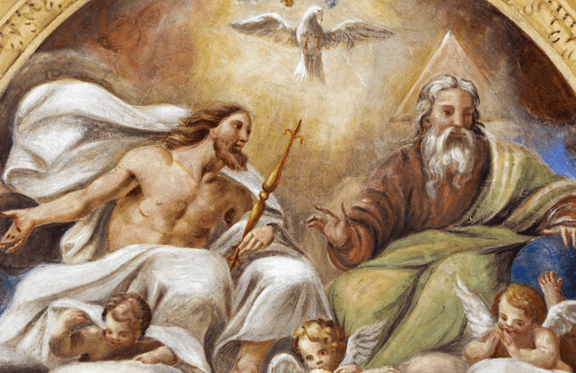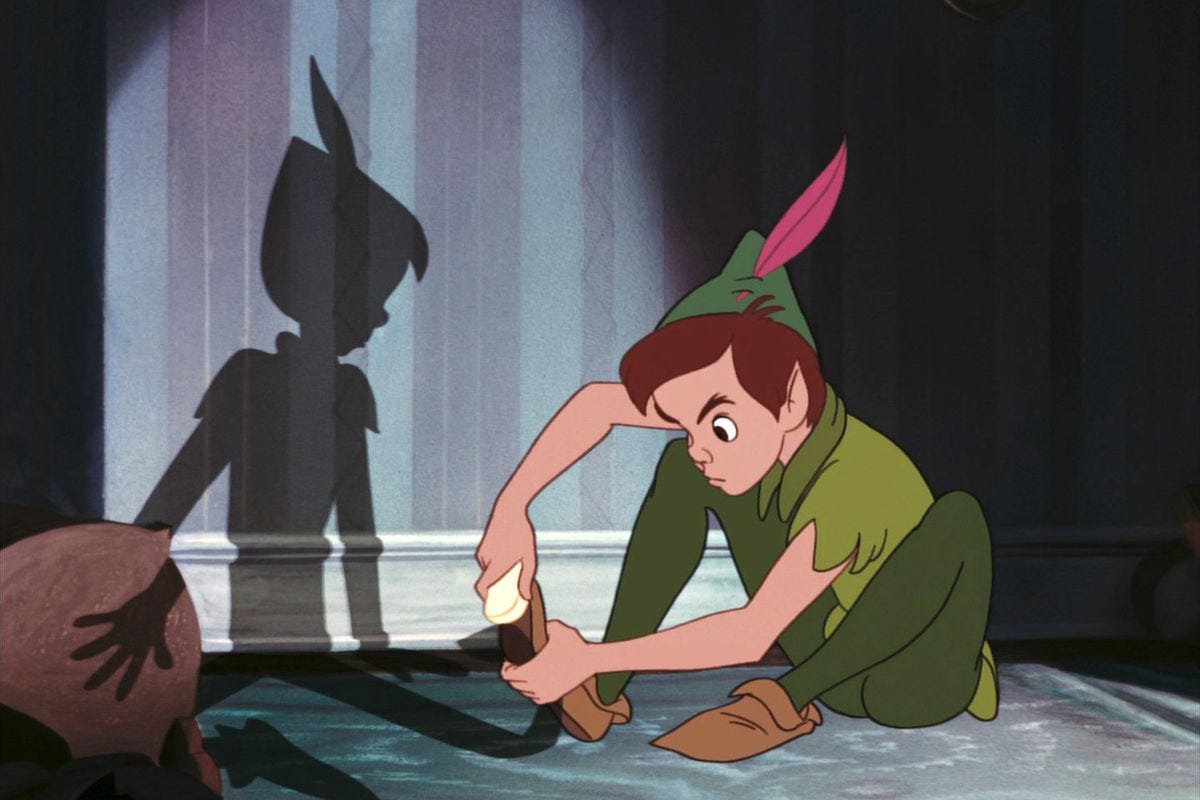Growing up is a process of killing the God
How we chase and kill God during adolescence. And how it's both scary and liberating at the same time.
"Everything that happens to us results from what we have thought, said or done. We alone are responsible for our lives."
- Gautama Buddha
I like to think about how reality is changing. Not the one outside that we don't have access to and maybe doesn't even exist. But the subjective one, the only one that exists. You can feel it, for example, when you first enter a new job, school, or building. The first day, it's a different building than on the three hundred and sixty-fifth day. Even though not a single brick has moved, a strange building looks and feels different on the first day than it does after some time. Just as we change buildings and parks with our own consciousness, we also change people, friends, and partners. Our mind escapes from our heads and sometimes, like a virus, and sometimes like a gentle touch, changes everything around us. Today I will tell you how my mind has been escaping during my growing up, etching away the idea of God, authority, immutability, and the absolute truth. I'll also tell you how I think adolescence is a process of trading absolutes for responsibility.
When I was a small kid, my parents were the absolute pillar of truth for me. Parents have figured in our minds for a very long time as the guardians of truth. If we need advice, we go to them. Though it is a little man's world, even his little world needs support or a shield from the huge and complex world. Can you remember how you used to consider your parents as a guarantee of absolute truth? Can you dig up any remnants, even tiny remnants, of the emotions that go along with that? That feeling that whenever you need, there's someone who knows the answer? It's a tremendous certainty. An almost addictive certainty that has its roots planted very deep in our minds. Perhaps this period creates the space we need to fill constantly. And it is this place that is at stake during adolescence. The place of belief in absoluteness.
In my case, I have been filling this place with different elements. After my parents, it was God. Though it didn't last long, my relationship with God left some specific feelings in my mind. A sense of guaranteed righteousness. A sense that all my deeds were being written down somewhere. And, perhaps more fundamentally, others deeds are being written down somewhere. Everything is okay because there is some sort of absolute righteous force that is in control. When everything goes wrong, there is something that stops the destruction and puts things right again. Isn't it interesting how similar this is to how we think of our parents as little children? And it's probably not a coincidence that we refer to God as a father. The ever-present entity who watches over everything and protects us.
But it doesn't always have to be God. Think with me. Who did you look up to when it wasn't even your parents? Could it have been friends? Older siblings? Can you pause for a moment and hunt in your memory what feelings you had for that person?
As I mentioned earlier, my relationship with God didn't last long. As they say, I grew out of it. Traditionally, entering a period of rebellion. I discovered people who prided themselves on critical thinking and rationality, which was supposed to be a better alternative to blind faith in God. Richard Dawkins, Sam Harris, Christopher Hitchens or later, Jordan Peterson. Don't be fooled, though; it really was an alternative. These were people who, for a period of my life, settled into the same place of infallibility that the idea of God had inhabited until then. Ironically, I prided myself on being a critical thinker and not believing in absolute authority. Rationally, I would respond that I certainly don't consider their views infallible. On the level of emotion, however, it was the same process - emotionally, they were infallible to me, just like God.
How do I know that I believed them irrationally? I saw this most clearly in my own reaction when I discovered that some of these men were wrong about something. I was genuinely surprised that I disagreed with them on something. Again, though, on an emotional level, because I couldn't be surprised rationally. And I'm sure you've experienced something like this as well. Favourite politician? A sportsman? Can you think of a moment when your role model was wrong about something, and you felt an emotional conflict? "How is it possible that he or she is so obviously wrong?"
I observe the unveiling of the illusion of infallibility in myself more and more often. Having discarded the cult-like worship of some popularizers of science, I had hoped to find certainty in scientific articles. After all, that's what science is! That's where the data is, chiselled in stone like Moses' Ten Commandments. "This scientific study shows that ...". And what if I told you that scientific studies are not sacred texts? What if I told you that scientific studies are written by humans? The same people who make mistakes and love to lie. Rationally, we understand that, but reconciling that with emotional feeling is a whole other task. I'll tell you a secret: since I read scientific studies carefully, I trust less the ones I don't read carefully.
Everywhere I look, the illusion crumbles. The courts, the laws, the whole social order. With the arrival of one virus, the illusion of an infallible system collapsed like a house of cards. Suddenly the absoluteness of shop opening hours was no longer absolute. Shops simply closed, even though google maps said they were open. Insanity! The absoluteness of work contracts suddenly wasn't absolute. It was just a piece of paper! Many of us didn't come to work, just like that! But isn't it strange, on the contrary, that we were going to work until then, on the basis of the same piece of paper? Think about it... Think about how confident you are that your paycheck will come every month based on a piece of paper. And if it doesn't come for some reason, wouldn't it be worth thinking about why that surprises you?
Something deep inside us craves stability, immutability and rules that cannot be circumvented. And we insert this desire, bits and pieces of our minds, into various aspects of our daily lives. Just as Voldemort, with his Horcruxes, protected his immortality, we protect our mental well-being. Because admitting that the world is chaotic and rules are a made-up concept is uncomfortable. And the reason it's uncomfortable is quite simple - we're afraid of responsibility. Just like little children. Who would we go to if we were wronged and our parents weren't there? Who would we take "verified facts" from if the authority of a scientist wasn't there? Who would deal with our transgressions if there were no pastors representing God Himself? Only ourselves. Absolutism is an addictive illusion that deprives us of responsibility and mental maturity.
Of course, some trust in rules that cannot be broken is necessary for functioning the social order and human relationships. When I wake up in the morning, I trust that the rest of the population will respect the laws of society. I need to trust that the boss will respect the employment contract. I need to trust that the scientist on the radio knows what he is talking about. But with (mental) adulthood should come a liberating yet frightening uprooting of the belief in absolutes.
Liberating because uprooting the illusion of immutability makes our minds plastic. If a thousand people have walked the same path before me, it doesn't mean it's the only right path. Whoever said a molecular biologist can't become a computer programmer or a musician? When has it ever happened to you that you remained convinced that having a boss was the only right solution? When did you come to a conclusion, unquestioningly, that you can't learn astrophysics? Because the sacred paper has "degree in economics" written on it? The world is not a concrete room. The hardness of the walls is an illusion. In reality, the reality is soft plasticine that needs to be pushed around for a while, and it will yield all sorts of shapes.
However, this has to do with the flip side of adolescence and why many adults find it difficult to grow up. Plasticine really doesn't protect as well as concrete. Trading freedom for responsibility inevitably carries risk. Perhaps there is an objective reason why everyone before me has followed the same path. Maybe there's a pack of wolves roaming the side, one that will tear me apart? That said, I need to prepare myself. It means I have to learn to protect myself. It means I have to think for myself. And last but not least, maybe it means I'm gonna die. And that's one of the hardest concepts we subconsciously try to soak into our minds during adolescence. But often, we can't handle it, and as young children, we look for our Father and Mother to set things right.
Find a moment of silence and identify your own "Horcruxes" of immutability. It takes time, but several of them can be destroyed or reduced. Observe how your consciousness consequently leaks out into the world and changes it. The buildings will not be the same buildings. Relationships will not be the same relationships. Reality will not be the same reality. Its concrete foundation will sag like plasticine under the weight of your mind. Adolescence is a barter, a difficult and scary one. But it comes with the sweet reward of freedom.








